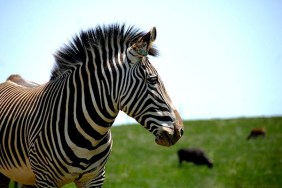(image via: WAG Malawi)
Iron deficiency anemia and malnutrition are among the most serious health concerns in developing African countries. A Nigerian nutritionist is now singing the praises of a food that may help turn that around. Her solution is cheap, readily available, extremely nutritious and – according to the study – quite tasty. The magical food is the giant West African land snail, a huge snail that is easily cultivated but also very readily found in in the forests and swamps of African nations. It’s a notoriously invasive species that is illegal to have in the U.S., though it’s commonly kept as a pet in other countries.
(image via: Planet Catfish)
So how will a snail save starving children? Ukpong Udofia of the University of Uyo reported in her study that the snail’s meat is rich in protein and iron, two very important components of a young child’s diet, as well as other key nutrients. Chronic iron deficiency leads to anemia and can, eventually, result in death. Finding a readily available and affordable source of nutrition is the key to creating a healthier population, and the giant snail easily fulfills both of those requirements. Even more so than beef and other livestock typically grown to provide protein and iron. Snail is also easier and cheaper to grow, consumes far fewer resources during the growing process, and would presumably be mature and ready to eat in a shorter amount of time.
(image via: Treehugger)
But would kids even eat snail meat? Maybe not Western kids who are used to hamburgers and chicken nuggets, but people in Nigeria and surrounding countries have been eating snails all along. When Udofia and her research colleagues conducted a taste test between beef pies and snail pies, most of the mothers and young children interviewed preferred the appearance, taste and texture of the snail pie.
(image via: Planet Catfish)
Besides providing essential iron and protein, snail meats provides calcium, copper, magnesium, phosphorus, zinc, essential fatty acids, and vitamins A, B6, B12 and K. The meat is low in fat but rich in healthy polyunsaturated fat. Obviously using snails as a regular food source won’t solve the malnutrition problem in Africa overnight, but cultivating the lower-cost alternative to beef and other protein sources could save countless lives in the long run.







